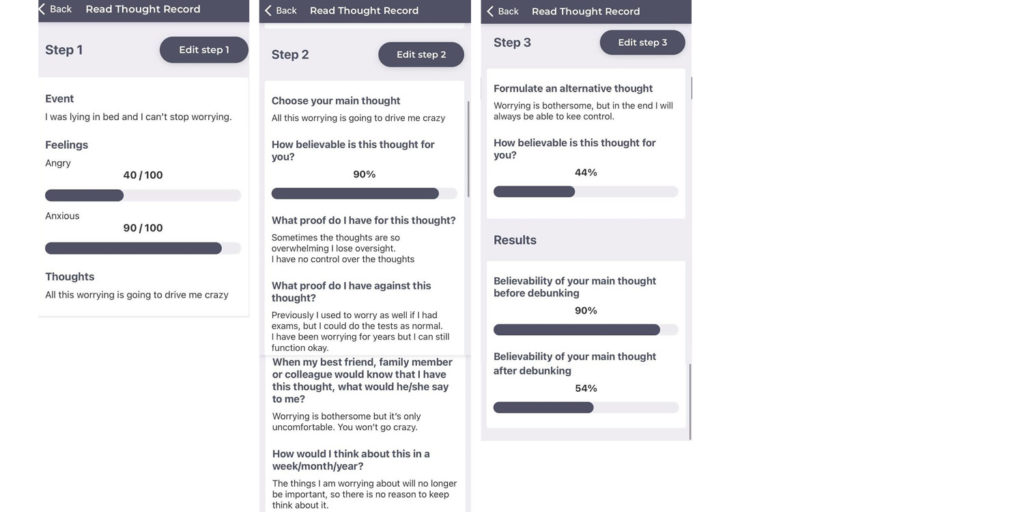When you worry a lot, it is important to examine the underlying beliefs or thoughts you have about worrying. These are the beliefs you have about your own thinking, instead of about the content of your worrying thoughts.
Examples are: “Help, all this worrying is really going to drive me crazy!” or “All this worrying can’t be good for my heart“.
To investigate your beliefs about worrying, you can fill in a Thought Record (Thought records are available in the NiceDay app):
- Step 1: Describe the moment during which you are worrying, fill out your feelings and, in the section ‘Thoughts’, fill out your thoughts and beliefs about the worrying.
- Step 2: For the main thought, choose the thought or belief that you want to explore. If you have multiple thoughts or beliefs, you can use a new Thought Record for each belief, and then skip ahead to the questions that you want to answer. For this exercise, you will at least answer questions 1a and 1b. In doing so, you can write down arguments that support or contradict your belief about worrying. You can also use the questions 2 to 7 to help you with this.
- Step 3: Enter an alternative balanced belief here. This is a belief that may be more realistic than the old belief you held.
Below, you can find a completed example:

Questions: Arguments that contradict the beliefs about worrying
Write down arguments or experiences that prove that your opinion is not (completely) valid. You can use these questions to help you with this:
- What arguments contradict your belief about worrying? Have you had experiences that prove that your opinion is not always or not completely correct? What indications are there that prove that your belief about worrying is incorrect?
- Is there someone whose opinion you value a lot? There might be several people. What arguments would they make that contradict your view of worrying? And what do you think of these arguments?
- Suppose someone from your family or circle of friends shares your opinion about worrying, what would you say to him/her? Would you argue that their view may not be (entirely) valid? Would you say that to reassure them, or would you really mean it? And could you also apply these arguments to your own belief about worrying? Or do ‘other rules’ apply to you?
- If you had to appear in court, what evidence would you gather against your perspective on worrying?
- Suppose we travel twenty years ahead into the future and you are older and wiser. You are reflecting back on the beliefs you currently have about worrying. What arguments could you make against your beliefs about worrying?
- Are there people in your circle of family or friends who believe that your belief about worrying is incorrect? If so, for what reasons?
- If you are examining a negative belief, ask yourself: how many times in your life have you been worrying and how many times have the consequences you are worrying about actually proven valid? Rarely? What does that mean for your negative view of worrying?
- If you are investigating a positive belief, ask yourself the following questions: have there been situations in your life that you weren’t worried about? If yes, which ones? How did those situations unfold? If these situations also unfolded well, what does that mean for your positive belief of worrying?
Source:
Keijsers, G. P. J., Van Minnen, A., Verbraak, M., Hoogduin, C. A. L. & Emmelkamp, P., (2017). Protocollaire behandelingen voor volwassenen met psychische klachten.

 Print
Print 
